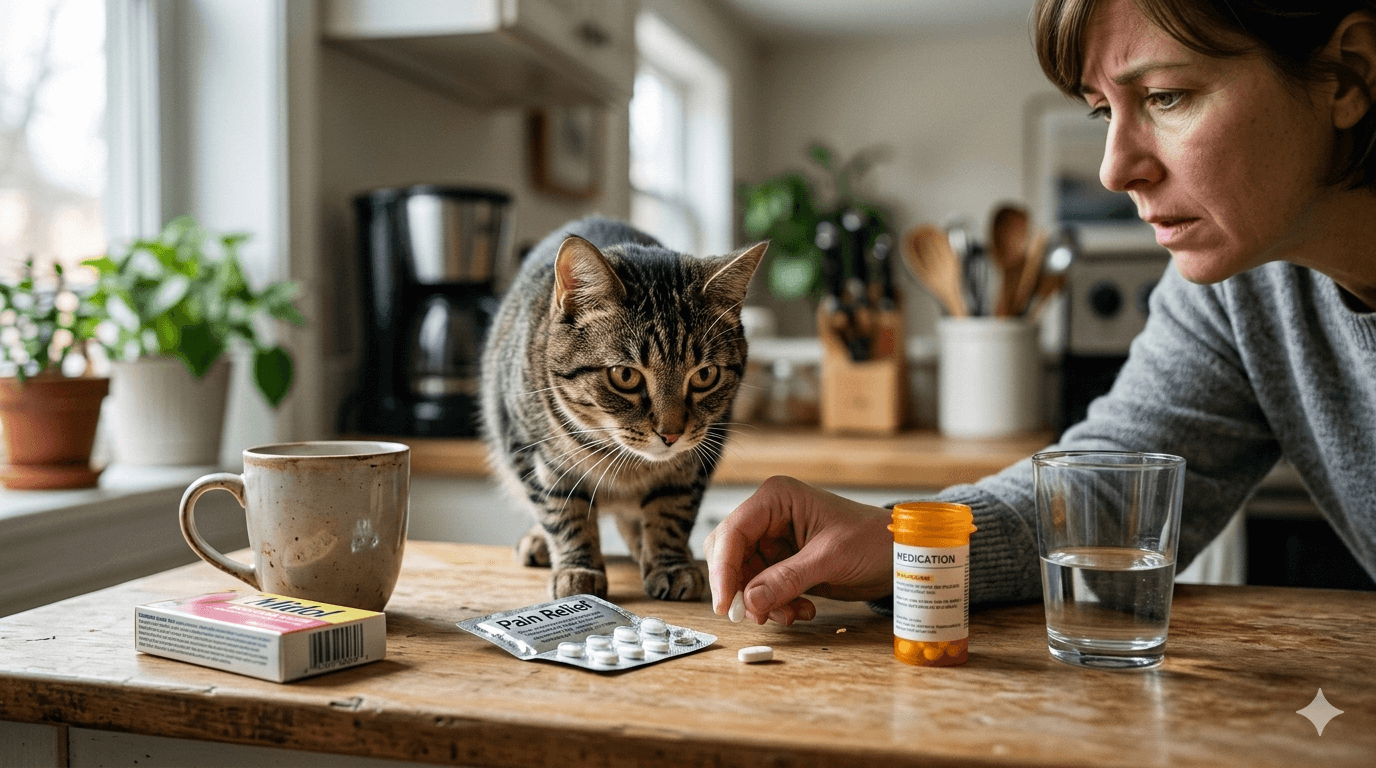Understanding Cat Anti-Anxiety Medication: A Guide to Calmer Felines
Cats are often perceived as independent and self-sufficient creatures, but even they can experience stress and anxiety. Whether it’s due to changes in their environment, loud noises, or health issues, anxiety in cats can manifest in destructive behaviors, excessive grooming, or withdrawal. Thankfully, cat anti-anxiety medication offers a way to help our feline companions feel more at ease. In this blog post, we’ll explore the different types of medications available, their benefits, potential side effects, and alternative approaches to managing feline anxiety. By the end, you’ll have a clearer understanding of how to support your anxious cat and improve their quality of life.
Common Signs Your Cat May Need Anti-Anxiety Support
If you’ve noticed unusual behavior in your cat, it might be a sign that they’re struggling with anxiety. Cats communicate their discomfort in subtle ways, and recognizing these signs early can make a big difference. Here are some common indicators that your cat may benefit from anti-anxiety medication or other interventions.
Excessive Grooming :
Over-grooming to the point of hair loss or skin irritation can signal stress or anxiety.Aggression Towards People or Other Pets :
Sudden aggression may indicate fear or discomfort in their environment.Hiding or Avoidance :
Cats that hide excessively or avoid interaction may be feeling overwhelmed.Destructive Behavior :
Scratching furniture, knocking over objects, or other destructive actions can stem from anxiety.Changes in Eating or Litter Box Habits :
A decrease in appetite or avoidance of the litter box might reflect emotional distress.
If you notice any of these behaviors, it’s important to consult your veterinarian. They can help determine whether anti-anxiety medication or other treatments are necessary for your cat’s well-being.
Types of Cat Anti-Anxiety Medications Available
When it comes to treating feline anxiety, there are several medication options available, each with its own benefits and considerations. Your veterinarian will guide you in choosing the best option based on your cat’s specific needs. Below are some common types of anti-anxiety medications for cats.
Prescription Medications :
These include drugs like fluoxetine or amitriptyline, which target chemical imbalances in the brain.Natural Supplements :
Options like L-theanine or melatonin can provide calming effects without harsh side effects.Pheromone Diffusers :
Synthetic pheromones mimic a cat’s natural calming scents and are available in sprays or plug-ins.Herbal Remedies :
Chamomile or valerian root may help reduce stress in mild cases of anxiety.Behavioral Modifiers :
Some medications focus on altering specific behaviors rather than addressing overall anxiety levels.
While these medications can be highly effective, they should always be used under veterinary supervision to ensure safety and proper dosing.
Check this guide 👉Medicine for Cat Allergies: Best 7 Expert Tips!
Check this guide 👉Top 3 Best Cat Pill Shooters for Stress-Free Medication!

Benefits of Anti-Anxiety Medication | Things to Monitor When Using Medication |
|---|---|
Reduces stress-related behaviors | Watch for adverse reactions like lethargy |
Improves social interactions | Monitor changes in appetite or hydration |
Enhances overall quality of life | Keep an eye on grooming habits |
Helps manage chronic anxiety conditions | Report any unusual vocalizations to vet |
Supports recovery from trauma | Track progress over time |
Alternative Approaches to Managing Feline Anxiety
While medication can be incredibly helpful, it’s not the only solution for managing feline anxiety. Combining medication with behavioral and environmental strategies can yield the best results. Here are some non-medication approaches to consider.
Environmental Enrichment :
Provide toys, scratching posts, and climbing structures to keep your cat mentally stimulated.Routine and Consistency :
Establishing a predictable daily schedule can reduce stress caused by uncertainty.Safe Spaces :
Create quiet, secluded areas where your cat can retreat when feeling overwhelmed.Positive Reinforcement Training :
Reward calm behavior with treats or affection to encourage relaxation.Desensitization Techniques :
Gradually expose your cat to triggers in a controlled manner to reduce fear responses.
By incorporating these strategies, you can create a supportive environment that complements any medical treatment your cat receives.
Tips for Administering Anti-Anxiety Medication to Cats
Giving medication to a cat can sometimes feel like an impossible task, but with patience and preparation, it becomes much easier. Here are some practical tips to make the process smoother for both you and your feline friend.
Use Pill Pockets or Treats :
Hide pills in specially designed treats to mask the taste of the medication.Crush and Mix :
For certain medications, crushing the pill and mixing it with wet food can work wonders.Liquid Formulations :
If possible, ask your vet about liquid alternatives that are easier to administer.Stay Calm and Confident :
Cats pick up on your energy, so remaining calm helps them feel more secure during administration.Reward Afterward :
Offer a favorite treat or playtime immediately after giving the medication to create positive associations.
With practice and persistence, you’ll find a method that works best for your cat, making medication time less stressful for everyone involved.
Common Causes of Anxiety in Cats
Understanding the root causes of anxiety in cats is essential for addressing their emotional needs effectively. Anxiety can stem from a variety of sources, and identifying these triggers can help you create a more supportive environment for your cat. Here are some common causes of feline anxiety.
Environmental Changes :
Moving to a new home, rearranging furniture, or introducing new pets can disrupt a cat’s sense of security.Loud Noises :
Thunderstorms, fireworks, or construction sounds can overwhelm sensitive feline ears.Health Issues :
Pain or discomfort from underlying medical conditions can lead to increased stress and anxiety.Social Stress :
Lack of socialization or conflicts with other animals in the household can cause tension.Separation Anxiety :
Some cats become anxious when left alone for extended periods, especially if they’re highly attached to their owners.
By pinpointing the source of your cat’s anxiety, you can take proactive steps to minimize their stress and improve their overall well-being.
Signs That Anti-Anxiety Medication Is Working
Once your cat begins anti-anxiety treatment, it’s important to monitor their behavior for signs of improvement. While results may vary depending on the medication and the individual cat, certain positive changes can indicate that the treatment is effective. Here’s what to look for.
Reduced Aggression :
A calmer demeanor and fewer incidents of biting or scratching suggest progress.Improved Social Behavior :
Increased willingness to interact with family members or other pets is a good sign.Better Sleep Patterns :
Cats sleeping more soundly and resting in open spaces reflect reduced stress levels.Decreased Destructiveness :
Less scratching, chewing, or knocking over objects indicates a calmer state of mind.Normal Grooming Habits :
Returning to regular grooming without overdoing it shows emotional balance.
These behavioral shifts signify that the medication is helping your cat feel more at ease, but always consult your vet if you have concerns about their progress.
Preventive Measures to Reduce Future Anxiety Episodes
Preventing future episodes of anxiety involves creating a stable and enriching environment for your cat. By taking proactive steps, you can minimize the likelihood of recurring stress and help your cat maintain a calm disposition. Consider these preventive measures.
Maintain a Consistent Routine :
Stick to regular feeding, play, and bedtime schedules to provide structure.Provide Mental Stimulation :
Puzzle toys, interactive games, and window perches keep your cat engaged and entertained.Limit Exposure to Triggers :
Identify and reduce exposure to known stressors like loud noises or unfamiliar guests.Encourage Exercise :
Regular play sessions help burn off excess energy and reduce tension.Regular Vet Check-Ups :
Routine health assessments ensure any physical issues contributing to anxiety are addressed promptly.
By implementing these strategies, you can foster a peaceful environment that supports your cat’s mental and emotional health, reducing the need for long-term medication.
Frequently Asked Questions About Cat Anti-Anxiety Medication
Are anti-anxiety medications safe for long-term use?
Many medications are safe for extended use, but regular check-ups with your vet are essential to monitor your cat’s health.
Can I use human anti-anxiety medications for my cat?
No, human medications can be toxic to cats. Always consult your vet before giving any medication.
How long does it take for anti-anxiety medication to work?
The timeline varies depending on the medication, but improvements are often seen within a few weeks.
What if my cat refuses to take medication?
Discuss alternatives like compounded formulations or supplements with your veterinarian.
Can lifestyle changes alone resolve my cat’s anxiety?
In mild cases, yes, but severe anxiety typically requires a combination of medication and behavioral interventions.
Final Thoughts: Supporting Your Anxious Cat
Managing feline anxiety is a journey that requires patience, understanding, and collaboration with your veterinarian. While cat anti-anxiety medication can be a powerful tool, it’s most effective when paired with environmental adjustments and behavioral techniques. Remember, every cat is unique, so what works for one may not work for another. By staying attentive to your cat’s needs and maintaining open communication with your vet, you can help your furry companion live a happier, calmer life. With the right approach, you’ll see your once-anxious cat thriving in their newfound peace.
Can I Give My Cat Midol? Best 7 Expert Tips! – Learn the risks, symptoms, and safe alternatives to keep your cat healthy and avoid toxic reactions.
Can I Give My Dog Midol? Best 7 Expert Tips! – Discover the risks, safe alternatives, and expert advice to keep your dog safe from accidental poisoning.
Maximum Weight for Cats on Planes: Best 7 Expert Tips! – Learn airline policies, tips to stay compliant, and ensure safe travels for your feline friend.
Max Weight for Dogs on Planes: Best 7 Expert Tips! – Discover airline weight limits, safe travel tips, and solutions for flying with your dog stress-free.





